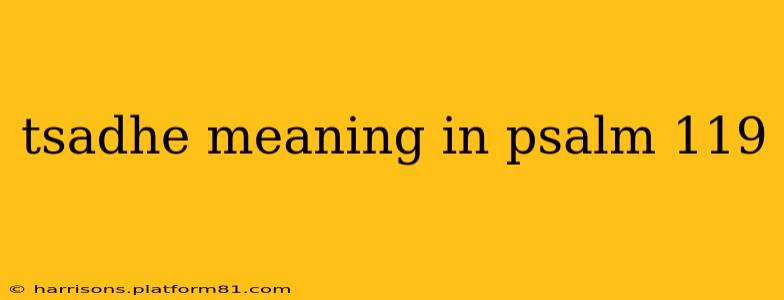Psalm 119, the longest chapter in the Bible, is an acrostic poem praising God's law. The Hebrew word tsaḏəq (צֶדֶק), appearing numerous times throughout the psalm, is central to its themes. Understanding its nuances is crucial to grasping the psalm's deeper meaning. While often translated simply as "righteousness," tsaḏəq encompasses a richer tapestry of meanings, including justice, uprightness, and even God's own faithful character.
This exploration delves into the multifaceted meaning of tsaḏəq in Psalm 119, considering its various contexts and implications for the psalmist's relationship with God and his commitment to living a life aligned with divine law.
What Does Tsaḏəq Mean in Psalm 119?
At its core, tsaḏəq signifies righteousness, but this is not a passive state. It's an active, dynamic pursuit of what is right and just, both in the eyes of God and in relation to others. It embodies a commitment to living in accordance with God's will, reflected in his law.
The psalmist uses tsaḏəq to express his longing for God's righteous judgments (Psalm 119:107, 128), his desire to walk in God's righteous paths (Psalm 119:102, 133), and his plea for God's righteous help (Psalm 119:172). It isn't just about personal moral purity, but also about social justice and the establishment of a righteous order in the world.
How Does Tsaḏəq Relate to God's Law in Psalm 119?
In Psalm 119, tsaḏəq is inextricably linked to God's law (Torah). The psalmist views obedience to God's commandments not as a burdensome legalism, but as a path to righteousness and a way to experience God's blessing and favor. The psalmist's love for God's law is a direct expression of his pursuit of tsaḏəq. He delights in the law, meditates upon it, and strives to live according to its principles.
This connection highlights a critical aspect of tsaḏəq: it’s not merely about avoiding wrongdoing; it's about actively pursuing good and doing what is right according to God's standard.
What are the Different Aspects of Tsaḏəq in Psalm 119?
The multifaceted nature of tsaḏəq unfolds throughout Psalm 119, revealing various aspects:
-
Justice: This relates to God's righteous judgments and his upholding of justice in the world. The psalmist seeks God's just actions in his own life and prays for God's intervention in the face of injustice.
-
Uprightness: This describes a life characterized by integrity, honesty, and moral rectitude. The psalmist strives for an upright life, guided by God's law and principles.
-
Faithfulness: Tsaḏəq also reflects God's own faithfulness to his covenants and promises. The psalmist's trust in God and reliance on his promises is an aspect of his own pursuit of righteousness.
-
Impartiality: The justice inherent in tsaḏəq implies fairness and impartiality in dealing with others. The psalmist seeks to treat everyone with equity and avoid partiality.
What is the Significance of the Repeated Use of Tsaḏəq in Psalm 119?
The numerous repetitions of tsaḏəq underscore its centrality to the psalm's message. It's not just a recurring theme; it's the very essence of the psalmist's devotion and the foundation of his relationship with God. The repetition emphasizes the psalmist's unwavering commitment to pursuing righteousness in all aspects of his life.
Conclusion:
The word tsaḏəq (צֶדֶק) in Psalm 119 transcends a simple definition of "righteousness." It paints a vibrant picture of a life lived in close communion with God, guided by his law, and dedicated to upholding justice and integrity in all things. Understanding this multifaceted meaning deepens our appreciation for the psalm's profound message and its enduring relevance for believers today. The psalmist's longing for tsaḏəq serves as a powerful example of the ongoing pursuit of holiness and justice that defines a life dedicated to God.
